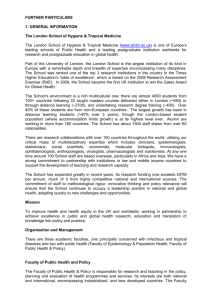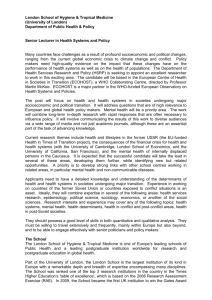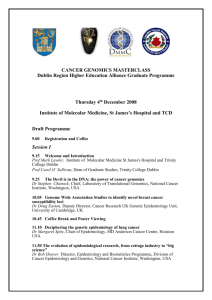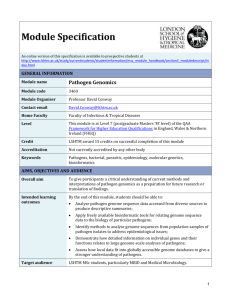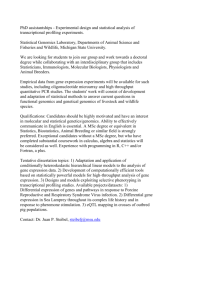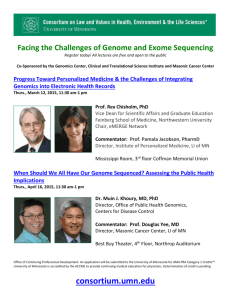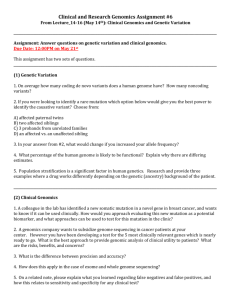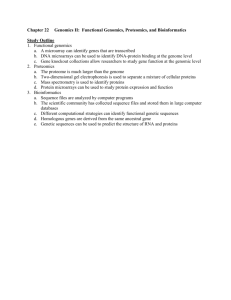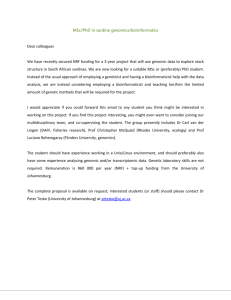Job Description - Jobs at LSHTM
advertisement
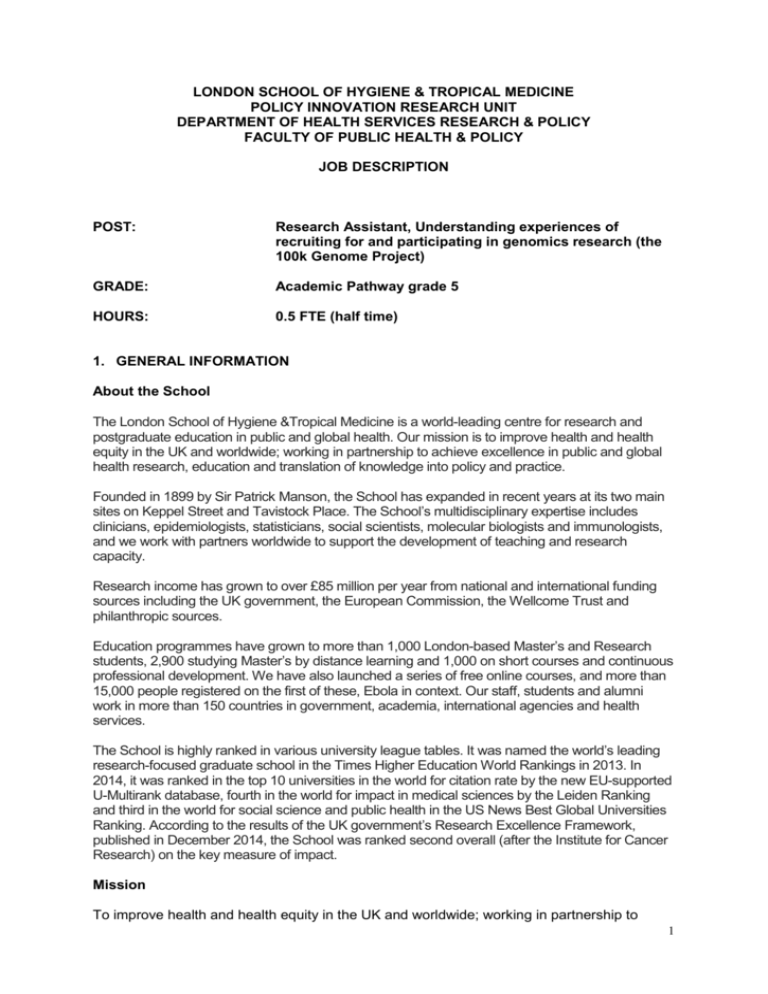
LONDON SCHOOL OF HYGIENE & TROPICAL MEDICINE POLICY INNOVATION RESEARCH UNIT DEPARTMENT OF HEALTH SERVICES RESEARCH & POLICY FACULTY OF PUBLIC HEALTH & POLICY JOB DESCRIPTION POST: Research Assistant, Understanding experiences of recruiting for and participating in genomics research (the 100k Genome Project) GRADE: Academic Pathway grade 5 HOURS: 0.5 FTE (half time) 1. GENERAL INFORMATION About the School The London School of Hygiene &Tropical Medicine is a world-leading centre for research and postgraduate education in public and global health. Our mission is to improve health and health equity in the UK and worldwide; working in partnership to achieve excellence in public and global health research, education and translation of knowledge into policy and practice. Founded in 1899 by Sir Patrick Manson, the School has expanded in recent years at its two main sites on Keppel Street and Tavistock Place. The School’s multidisciplinary expertise includes clinicians, epidemiologists, statisticians, social scientists, molecular biologists and immunologists, and we work with partners worldwide to support the development of teaching and research capacity. Research income has grown to over £85 million per year from national and international funding sources including the UK government, the European Commission, the Wellcome Trust and philanthropic sources. Education programmes have grown to more than 1,000 London-based Master’s and Research students, 2,900 studying Master’s by distance learning and 1,000 on short courses and continuous professional development. We have also launched a series of free online courses, and more than 15,000 people registered on the first of these, Ebola in context. Our staff, students and alumni work in more than 150 countries in government, academia, international agencies and health services. The School is highly ranked in various university league tables. It was named the world’s leading research-focused graduate school in the Times Higher Education World Rankings in 2013. In 2014, it was ranked in the top 10 universities in the world for citation rate by the new EU-supported U-Multirank database, fourth in the world for impact in medical sciences by the Leiden Ranking and third in the world for social science and public health in the US News Best Global Universities Ranking. According to the results of the UK government’s Research Excellence Framework, published in December 2014, the School was ranked second overall (after the Institute for Cancer Research) on the key measure of impact. Mission To improve health and health equity in the UK and worldwide; working in partnership to 1 achieve excellence in public and gloabl health research, education and translation of knowledge into policy and practice. Organisation and Management There are three academic faculties, one principally concerned with infectious and tropical diseases and two with public health (Faculty of Epidemiology and Population Health; Faculty of Public Health and Policy). Faculty of Public Health and Policy The Faculty of Public Health & Policy is responsible for research and teaching in the policy, planning and evaluation of health programmes and services. Its interests are both national and international, encompassing industrialised, and less developed countries. The Faculty has three research departments: o Health Services Research and Policy o Global Health and Development o Social and Environmental Health Research Each department is multidisciplinary containing about 100+ academic staff representing medicine, statistics, epidemiology, sociology, economics, anthropology, operational research, psychology, nursing and history. Each department is responsible for its own research. The School has adopted a rotating system of management for its academic departments and faculties. The management of a department is under the control of the Department Head, appointed by the Director of the School for a period of three years in the first instance. The Faculty Head is appointed in a similar manner but for an initial period of up to five years. Teaching The Faculty of Public Health and Policy is responsible for organizing one year Masters courses in Public Health, which allow students to take a general MSc in Public Health, or to follow one of the following streams: Health Services Management, Health Promotion, Environmental Health or Health Services Research. The Faculty also jointly teaches MSc Public Health in Developing Countries and MSc Control of Infectious Disease (with the Faculties of Infectious and Tropical Diseases and Epidemiology and Population Health), and MSc Health Policy, Planning and Financing (with the LSE). Masters courses are organised in a modular format across the whole School. One of the growing areas of Faculty teaching is in the distance-based MSc courses in Public Health, introduced in 2005/6, and Global Health Policy, introduced in 2011/12. The Faculty has also reorganised and expanded its research degree (MPhil/PhD; DrPH) training. Currently, there are about 108 students and 23 staff members registered for a research degree. Department of Health Services Research and Policy The aim of the Department is to carry out research that helps to improve the quality, organisation and management of health services and systems. This extends from establishing what care should be provided and how services should be organised, through assessing the quality of existing services, to how improvements can be brought about. Most of the research is in high income countries and, in particular, the UK. Our staff reflect both the multi-disciplinary (epidemiology, public health, sociology, psychology, economics, statistics, social and public policy) and multi-professional nature of our work (http://www.lshtm.ac.uk/php/hsrp/index.html). 2 Establishing what care should be provided and how services should be organised involves primary evaluative research (on particular health care interventions and policies), reviews of existing research evidence and modelling possible options. In addition to specific projects, DHSRP staff run the Clinical Effectiveness Unit at the Royal College of Surgeons of England, and the Office for Research and Clinical Audit at the Royal College of Obstetricians & Gynaecology, as well as host the Department of Health-funded Health Reforms Evaluation Programme (http://www.lshtm.ac.uk/hsru/hrep/). Further, the DHSRP is home to the Policy Innovation Research Unit (http://www.piru.ac.uk/), the Policy Research Unit for Commissioning and the Health Care System (http://www.prucomm.ac.uk/about-us), and the LSHTM hub of the NIHR School for Public Health Research. The Department is part of the School’s European Centre on Health of Societies in Transition (ECOHOST) (http://www.lshtm.ac.uk/ecohost/) which, in turn, is a major partner in the WHO-funded European Observatory on Health Systems and Policies (http://www.euro.who.int/observatory). Policy Innovation Research Unit (PIRU) A collaboration led from the London School of Hygiene and Tropical Medicine won and initial five years of funding in 2010 from the Department of Health (DH) in England to establish a novel Policy Innovation Research Unit (PIRU) which began work in January 2011. Recently, DH extended PIRU’s funding for a further two years (from January 2016 through December 2017). The purpose of the Unit is to provide high quality policy-relevant research and advice on the evaluation of pilots and other policy innovations to the DH, through a planned programme of evaluative work plus responsive work designed to contribute to early stage policy development. The Unit is based in the Department of Health Services Research and Policy at London School of Hygiene and Tropical Medicine, with key partners, the Personal Social Services Research Unit at the London School of Economics and Imperial College Business School. Other organisations are involved in specific projects undertaken by the Unit (for example RAND Europe and the Nuffield Trust). The Unit is led by Nicholas Mays. The work programme is unconventional in that it is not topic-based, but includes research and advice related to a broad range of evaluation methods and topics (for example, in relation to pilots and other forms of structured policy or service innovation), and relates to policy initiation, development and implementation processes, potentially across any part of the portfolio of the DH (including health services, public health and social care). Current projects include evaluations of the Public Health Responsibility Deal, the Integrated Care Pioneers, Direct Payments in Residential Care Trailblazers, and Social Impact Bonds Trailblazers in health and social care. The project: Understanding experiences of recruiting for and participating in genomics research (the 100k Genome Project) The 100k Genome Project was set up to collect and analyse genetic data from people with rare diseases or infections, and their families, as well as from people with common cancers. The Project is planned to recruit until the end of 2017 with the aim of covering 100,000 genomes. This genetic information will be stored and used for future research, helping to learn more about the causes of different diseases, and develop new, more targeted treatments. To further improve the Project, Genomics England, NHS England and the DH need to understand more fully why patients and health care staff agree to get involved in genomics research; people’s experience of receiving information, giving consent and taking part; their attitudes to data sharing, governance and confidentiality (including their level of trust in the 100k Genome Project and similar initiatives); and their views about feedback and use of their data for research and clinical care. We also need to understand why some 3 people who are invited to take part refuse or drop out, since this may indicate the need to improve information provided and the consent process. Finally, we want to learn about the experiences of clinicians who ask people to take part since they are important for identifying potential participants and inviting them to take part. This Research Assistant role is focussed on understanding the experience of recruiting for and participating in the 100k Genome project. This research is being undertaken by PIRU in collaboration with a team from the Health Experiences Research Group (HERG) at the University of Oxford. 4 2. JOB DESCRIPTION Post: Research Assistant Responsible to: Professor Nicholas Mays Duties and responsibilities of the post i. Research Contribute to the research project, ‘Understanding experiences of recruiting for and participating in genomics research’ by: o undertaking a secondary analysis of interview data on participants’ experiences of biobanking to inform the design of the study o taking part in the conduct and analysis of focus groups with patients recruited to the 100k Genome Project and members of the public o analysing individual interview data, with a particular focus on the contribution of participant trust in the working of the project and in health data sharing, more widely. contribute to a broad multi-disciplinary Unit for policy innovation evaluation and analysis in England as required contribute to publications in peer-reviewed and prestigious journals (as well as other appropriate professional and public media), and assist in the preparation of project reports for the Department of Health, Genomics England and NHS England communicate research findings (or contribute towards communications) through international and national conferences, mass media and, in particular, through close engagement with national policy-makers, health and social care managers, and clinicians/other professionals, etc., as appropriate to particular projects ii. Teaching contribute up to 10% of his or her time to teaching, including: o being a seminar leader on one module or equivalent in Distance Learning teaching, or o tutoring 1 student (or Distance Learning equivalent) o undergoing training in teaching skills iii. Citizenship contribute to activities that will help to achieve PIRU’s and the Department’s objectives. Person specification Essential: A Masters degree in public health, health policy, health systems, or a closely related 5 field Some experience of undertaking and analysing qualitative interviews Some knowledge of current English health care policy and practice with particular reference to the collection and management of personal health data including linkage between different sources of data and biobanking Proven ability to contribute to writing either research reports or articles in peer reviewed or professional journals Ability to work in a team Ability to work with periodic supervision and to use appropriate initiative Good communication skills in English including some experience of presenting research findings orally Ability to spend some time based in Oxford to ensure effective collaboration with colleagues at the Health Experiences Research Group (HERG) and to travel to Genomic Medicine Centres throughout England to collect data Desirable: Organisational and administrative skills, including the ability to coordinate small projects or parts of large projects and to deliver research outputs to project deadlines Experience of synthesising evidence from a variety of sources including peer reviewed research and ‘grey’ literature Accountability The post-holder will be responsible to the Director of the Policy Innovation Research Unit. Salary and conditions of appointment This post is for 18 months, half time (0.5 FTE), from 1 July 2015 to 31 December 2016. Salary will be on the Academic Pathway, grade 5 (£32,324-£37,106 per year pro rata), inclusive of London Weighting). Appointment will be subject to LSHTM terms and conditions, including membership of the Universities Superannuation Scheme, an annual leave allowance of 30 days plus 6 fixed ‘Director’s Days’. Asylum and Immigration The School will comply with the Immigration, Asylum and Nationality Act 2006, which requires all employees to provide documentary evidence of their legal right to work in this country prior to commencing employment. Candidates will be required to bring their passport (and visa if applicable) to interview so that it can be copied and verified. For this post, we are unable to make successful application for a Certificate of Sponsorship, as the post is not line with the appropriate rate of salary under the Standard Occupational codes. We are unable to appoint an individual who is not currently eligible to work in the UK. 6 Further information about Certificate of Sponsorship and eligibility to work in the UK, can be found at: www.ukba.homeoffice.gov.uk/employers/points 7
